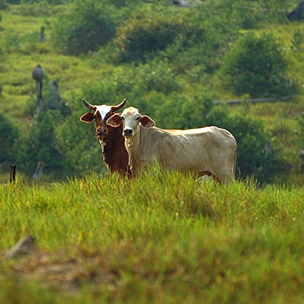May 15, 2015 — And now for some good news: It looks like some market-driven agreements around beef production in Brazil may be slowing deforestation in the country’s rainforests. That’s the finding reported by Holly Gibbs, an assistant professor of geography and environmental studies at University of Wisconsin–Madison, and a team of researchers in a paper published recently in Conservation Letters.
The researchers focused on the world’s biggest meatpacking company, JBS, which is located in the region. In 2009, under pressure from Greenpeace and the country’s government, JBS and other large meatpacking companies committed to “zero-deforestation agreements,” meaning they wouldn’t buy cattle raised on recently deforested land. This study shows that these agreements led ranchers that supply to JBS to register their land in an environmental registry and deforest less because JBS became more likely to refuse to purchase cattle from ranches with recent deforestation. In 2013, the study found, only 4 of 100 direct suppliers to JBS had recent deforestation on their land, whereas before 2009 that number was 4 in 10.
That “direct suppliers” is important, though. Slaughterhouses only keep track of suppliers selling directly to them, which means that cattle can be raised and fattened on other ranches only to be transferred to a zero-deforestation ranch as their penultimate stop. The ranches in the earlier stages could still be cutting down trees for cattle pastures.
Still, Gibbs sees these developments as a sign that the market can play a much-needed role in reducing deforestation across supply chains. “Public enforcement of environmental laws is a formidable task in the Brazilian Amazon, which covers an area six times the size of Texas,” Gibbs says in a press release about the study. “But these market-based interventions are leading to rapid changes in the beef industry within a period of months, even in very remote areas.” ![]()
Photo by Public.Resource.Org (Flickr | Creative Commons)
Ensia shares solutions-focused stories free of charge through our online magazine and partner media. That means audiences around the world have ready access to stories that can — and do — help them shape a better future. If you value our work, please show your support today.
Yes, I'll support Ensia!
